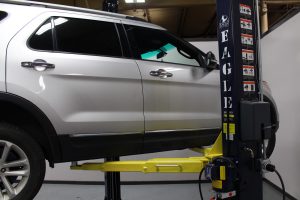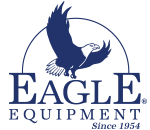 At Eagle Equipment, we feel that one of the most important parts of our job is helping customers make the most informed purchase they can. We often find ourselves as educators; correcting many assumptions in the industry.
At Eagle Equipment, we feel that one of the most important parts of our job is helping customers make the most informed purchase they can. We often find ourselves as educators; correcting many assumptions in the industry.
“If my vehicle weighs under 9,000 lbs., and I buy a 9K lift; I should be able to lift my vehicle all day long.”
People often try this with their full-size pickup trucks; then wonder why we suggest something more stout.
The first thing you need to know is what you’re lifting. Look at the sticker on the door jam for the weight and distribution. Then, take a glance to see what’s inside and where the weight is. Some trucks have toolboxes or other things that add a significant amount of weight to the vehicle.
According to the Editor of BRAKE & FRONT END Magazine, “Knowing the weight is essential in determining the center of gravity behind the front wheels. To find center of gravity, divide the rear wheel weight by the overall weight and multiply by the wheelbase (The wheelbase is the measurement from the wheel center not the overall length). Check in the lift manual where the center of gravity of the vehicle should be placed. The placement of the center of gravity will differ on asymmetrical lifts. A number of lift accidents can be traced to vehicles with unique loads like plumber trucks and vehicles with water or fluid tanks. If in doubt, weigh the vehicle. If you can’t weigh a questionable vehicle, don’t attempt to lift it, or get under it.”
